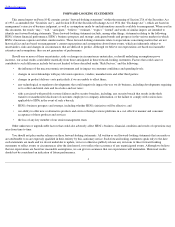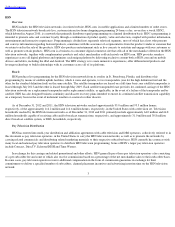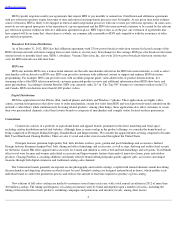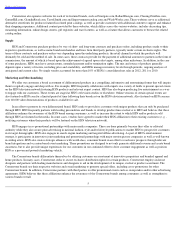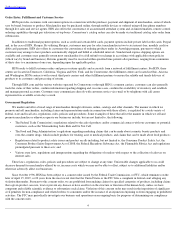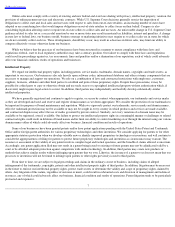Home Shopping Network 2012 Annual Report Download - page 15
Download and view the complete annual report
Please find page 15 of the 2012 Home Shopping Network annual report below. You can navigate through the pages in the report by either clicking on the pages listed below, or by using the keyword search tool below to find specific information within the annual report.
Table of Contents
We are subject to online and other cyber security risks and cyber incidents, including security and data breaches and identity theft.
To succeed, we must be able to provide for secure transmission of confidential information over public networks. We have observed an
increased number of cyber attacks that include gaining unauthorized access to digital systems for purposes of misappropriating assets or sensitive
information. Our failure, and/or the failure by the various third party vendors and service providers with which we do business, to comply with
applicable privacy policies or federal, state or similar international laws and regulations or any compromise of security that results in the
unauthorized release of personally identifiable information or other user data could damage the reputation of our businesses, discourage potential
users from trying our products and services and/or result in fines and/or proceedings by governmental agencies and/or consumers, one or all of
which could adversely affect our business, financial condition and results of operations. Any penetration of network security or other
misappropriation or misuse of personal consumer information could cause interruptions in the operations of our businesses and subject us to
increased costs, litigation and other liabilities. Security and data breaches could also significantly damage our reputation with consumers and
third parties with whom we do business. We may be required to expend significant capital and other resources to protect against and remedy any
potential or existing security and data breaches and their consequences. We also face risks associated with security and data breaches affecting
third parties with which we are affiliated or otherwise conduct business online.
We could be subject to additional sales tax liability, including liability for past sales.
U.S. Supreme Court decisions restrict the imposition of obligations to collect state and local sales taxes with respect to sales from out-of-
state retailers. As a result, approximately 41% of our revenue is not currently subject to sales tax or its equivalent. However, an increasing
number of states have adopted or are considering laws that attempt to impose obligations on out-of-
state retailers to collect taxes on their behalf.
Congress is also considering legislation allowing states to require remote sellers to collect sales and use taxes. It is not possible to predict with
any degree of certainty the outcome of these initiatives or the impact of these initiatives on our business and marketing strategies that we are
considering or may consider in the future.
An unfavorable change in U.S. Supreme Court guidance related to sales tax, or a successful assertion by one or more states may result in
material tax liabilities, interest and penalties. A change in state or federal laws, or our business model, business strategy, or marketing initiatives
may require us to collect sales tax in states in which we do not currently collect such tax. These developments, should they occur, may result in
a decrease in future sales, may decrease our ability to compete, or otherwise harm our business.
Increased delivery costs, particularly if we are unable to offset them by increasing prices without a detrimental effect on customer
demand, and the extent to which we offer shipping promotions to our customers, could adversely impact our profits.
We are impacted by increases in shipping rates charged by various shipping vendors relating to the procurement of merchandise from
vendors and manufacturers, the shipment of merchandise to customers and the mailing of catalogs, which over the past few years have
experienced volatility in comparison to historical levels. Variations in the mix and quantity of products we sell impact the cost to ship our
products as do the shipping promotions we frequently offer to drive revenues. We currently expect that shipping and postal rates will continue to
increase. In the case of deliveries to customers, we have negotiated favorable shipping rates, which increase at agreed upon levels over time,
with one independent, third party shipping company pursuant to a long-term contract. If this relationship were to terminate or if the shipping
company was unable to fulfill its obligations under the contract for any reason, we would have to work with other shipping companies to deliver
merchandise to customers, which could be at less favorable rates and could cause a disruption in our business. A significant increase in shipping
promotions as well as any increase in shipping rates and related fuel and other surcharges passed on to us by our shipping company may
adversely impact profits given that we may not be able to pass these increased costs directly to customers or offset them by increasing prices
without a detrimental effect on customer demand.
11


